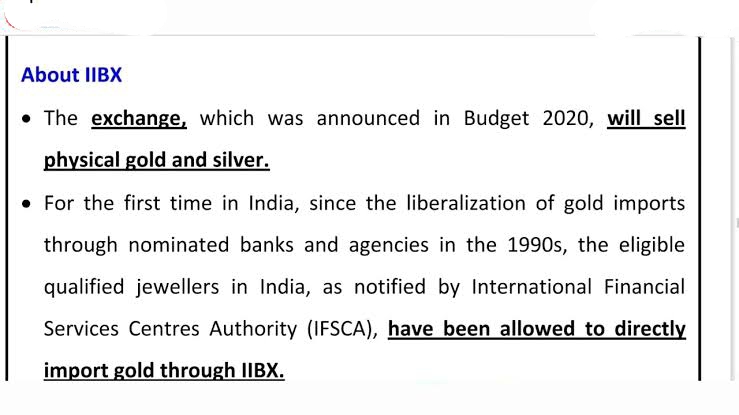
• The India International Bullion market (IIBX), which opened in Gujarat on July 29, 2022, is India’s first bullion market.
Bullion is the name for high-purity gold and silver that is usually kept in bars, ingots, or coins. It can be used as legal currency and is often kept as reserves by central banks or by institutional investors. The International Financial Services Centre (IFSC) is where IIBX was started.
It is the third swap in the world of its kind.
It is a platform that not only allows jewellers to trade on the exchange, but also has the infrastructure in place to store physical gold and silver.
• IIBX will help find the best prices while ensuring quality and responsible sourcing. It will also give a boost to the financialization of gold in India.
IFSCA is in charge of letting qualified jewellers in India know that they can directly import gold through IIBX. IIBX offers a wider range of products and technology services at a lower price than the Indian exchanges and other global exchanges in Singapore, Dubai, Hong Kong, New York, and London.
Significance
• It will give India the tools it needs to take its rightful place in the global bullion market and serve the global value chain with honesty and quality.
• IIBX also shows that the Indian government is still committed to giving India the power to affect global bullion prices as a major buyer.
International Financial Services Centres Authority
• The International Financial Services Centres Authority Act, 2019, made it possible for it to start up in April 2020.
Its main office is in GIFT City, Gandhinagar, in the state of Gujarat.
• Duties: All of these financial services, financial goods, and Financial Institutions in an IFSC must be regulated by the Authority. It could also tell the Central Government about other financial goods, services, and institutions that could be allowed in the IFSCs.
• Powers: All of the powers that the Reserve Bank of India, Securities and Exchange Board of India, IRDAI, and Pension Fund and Regulatory Development Authority, etc. can use under their own laws will be used by the Authority in the IFSCs to regulate financial products, financial services, and FIs that are allowed in the IFSC.
• Processes and Procedures: The Authority’s processes and procedures must be in line with the rules set out in the Acts of Parliament of India that apply to the financial goods, services, or institutions in question.
• Grants from the Central Government: After Parliament has passed a law in this area, the Central Government can give the Authority as much money as it thinks is right for the Authority’s goals.
• Transactions in Foreign Currency: All financial services in IFSCs must be done in the foreign currency that the Authority and the Central Government decide on together.







![UPSC CSE Topper Mains Answer [Gaurav Agarwal] word-image-10753-1](https://iasbio.com/wp-content/uploads/2023/06/word-image-10753-1-150x150.png)


![Ancient History Notes for UPSC [Part 8] Post Mauryan images-12](https://iasbio.com/wp-content/uploads/2021/07/images-12.png)




![UPSC CSE Topper Mains Answer [Part 2] images-2023-06-17T192027.770](https://iasbio.com/wp-content/uploads/2023/06/images-2023-06-17T192027.770-150x150.jpeg)
